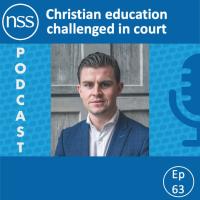
21st Century RE for All
We want every pupil to have the same entitlement to high quality, non-partisan education about religion and belief. We want to see all schools preparing young people for life in modern Britain by teaching pupils about the diversity of religious and non-religious worldviews.
We're campaigning for an end to the arbitrariness and unfairness of local determination in Religious Education and for a national religion and belief education syllabus as part of the National Curriculum.
What’s the problem?
Religious education is out of date and in need of reform. Almost thirty years after the introduction of a national curricular entitlement for all pupils, one subject remains exempt – religious education. Unlike any other compulsory subject RE is determined at a local level.
In each local authority the local agreed syllabus for religious education (RE) is determined by 'Standing Advisory Councils on Religious Education' (SACREs), largely made up of religious representatives, with non-religious representatives either excluded or barred from voting.
Even worse, many faith schools don't even need to follow the locally agreed syllabus, and can instead teach their own syllabus and teach religion from their own exclusive viewpoint.
If there is a body of knowledge called 'Religious Education', which is worthy of being taught at all, it should be offered to all children wherever they live. There are simply no grounds for discriminating on grounds of geographic location or school type. If a programme of study covering religion and belief deserves to be included in the school curriculum, it should be offered to all as a basic entitlement for every future citizen. This is simply a matter of fundamental justice and equality.
Importantly, the subject must be broad, balanced and inclusive. Religious interest groups should no longer determine what gets taught. As with other subjects, the syllabus should be nationally determined by independent educationalists without an agenda motivated by a specific religion or belief.
"The structures that underpin the local determination of the RE curriculum have failed to keep pace with changes in the wider educational world. As a result, many local authorities are struggling to fulfil their responsibility to promote high-quality religious education"
OFSTED report 'Religious Education: Realising the Potential'
Get involved
With the General Election coming up, as a nation we're thinking about our future. Please consider asking your candidate to support common sense secular reforms — such as reforming religion and belief education — that will make our society, education system, and laws fairer for all.
It’s time to take religious education in schools out of the hands of religious councils. Support a national entitlement to high quality, non-partisan education about religion and belief.
Sign the petition-
A selection of comments from the petition. Supporters on what this campaign means to them and the need to reform religion and belief education.
Find out more
NSS submission to the Commission on Religious Education
We’ve called on the Commission to support pupils’ basic entitlement to non-partisan education about religion and belief, and an end to RE controlled by religious groups or faith schools.
Religious Education and the law
RE is a statutory part of the basic curriculum in all schools, but is often shaped by local religious groups and faith schools.
Your rights: Withdrawal from RE and Collective Worship
We advocate comprehensive non-partisan reform of religion and belief education and an end to compulsory worship in schools, so no one has to withdraw from any part of the school day.
Why Religious Education must be reformed before ending parental opt-out
The right to withdraw from RE may sometimes be problematic, but is still necessary when until vestiges of confessionalism, proselytization and poor practice remain.
Standing Advisory Councils on Religious Education
Dominated by religious representatives, SACREs determine the RE syllabus at a local level.
Related news and opinion
Ep 63: Christian education challenged in court – a Northern Ireland case
Posted: Tue, 21 Dec 2021 08:00
A ground-breaking case on the right to a pluralistic education in Northern Ireland is currently being considered by the High Court.
A father of a seven-year-old girl at a primary school in Belfast has brought judicial review proceedings against the school and the Department of Education. He argues that the school's collective worship and Religious Education provisions are narrowly Christian, being effectively designed to indoctrinate children and denying their right to a pluralistic education, in which no one worldview is privileged over others. The case was heard by the High Court of Northern Ireland on 22-23 November.
In this episode, Darragh Mackin, solicitor for the applicants, discusses the case with Emma Park. Darragh is a partner at Phoenix Law, a firm of solicitors in Belfast that specialises in human rights. He describes how the girl's family, who are non-religious, discovered her praying late into the night. This led them to investigate the way that her school was imposing Christianity on young children through religious assemblies and RE lessons.
Darragh outlines the main issues in the case and the human rights principles involved. He explains how Christianity is embedded into the legal framework governing education in Northern Ireland. He also argues that proselytising religious instruction can reinforce the divisions at the heart of the region's historic troubles, and that it is therefore all the more important to ensure that children are brought up with open minds.
Follow-up
• Christianity being 'wrongly promoted and privileged in the classroom', court hears – Irish News
• Laws requiring exclusively Christian RE to face court challenge in NI
• Bill to replace worship with inclusive assemblies heads to Commons
Watch this episode on YouTube | Direct MP3 Link | Transcripts
Support the podcast, share with a friend, and leave a positive review everywhere you can.
Podcast produced by Emma Park for the National Secular Society (2021). All rights reserved.
Ep 61: Books for Secularists
Posted: Tue, 16 Nov 2021 08:00
Looking to explore the currents of thought behind secularism? Here are nine books to begin with.
In this episode, Emma Park and two guests discuss books that help contextualise Britain's secularist intellectual tradition, tracing a route through classical, Enlightenment, freethought, and humanist history. Each speaker proposes three books which, in their view, embody these interconnected currents of thought in one way or another, and which celebrate free speech and open enquiry.
Bob Forder is the National Secular Society's historian, and the great-great-grandson of Robert Forder, its first paid secretary.
Maddy Goodall is Humanist Heritage Coordinator at Humanists UK and in charge of the Humanist Heritage Project.
Got a suggestion for more 'books for secularists'? Email us at podcast@secularism.org.uk or tweet to @NatSecSoc with #BooksforSecularists.
Nine books for secularists, in order of publication:
– Lucretius, On the Nature of the Universe (mid-first century BC). Prose translation e.g. by R. Latham.
– Thomas Paine, Age of Reason (1794-5)
– The Trial of the Rev. Robert Wedderburn for Blasphemy (1820)
– Edward Fitzgerald, Rubáiyát of Omar Khayyám (first edition 1859)
– Charles Bradlaugh, Speeches (1890)
– Florence Dixie, Towards Freedom (1904)
– Dora Russell, The Tamarisk Tree (1975)
– Caroline Fourest, In Praise of Blasphemy / Éloge du blasphème (2015)
– Barbara Smoker, My Godforsaken Life (2018)
Watch this episode on YouTube | Direct MP3 Link | Transcripts
Support the podcast, share with a friend, and leave a positive review everywhere you can.
Podcast produced by Emma Park for the National Secular Society (2021). All rights reserved.
It's time to move on from religious education
Posted: Tue, 17 Aug 2021 11:20
RE has become a subject in search of a purpose. There are better approaches to learning about the diversity of beliefs, and better uses of time than using outdated legislation to perpetuate it, says Keith Sharpe.
Rather than a distinct area of learning as with other curriculum subjects like maths, history or physics, religious education has always been a form of socialisation, a process through which children are inducted into a national identity based on societal norms, values and beliefs. Over the past 80 years these have changed drastically, critically undermining the justification for 'religious education' as a distinct subject.
The 1944 Education Act put religious education on the school curriculum as a legal requirement. RE was the only subject of the curriculum which that act prescribed; everything else was left to the discretion of schools and individual teachers. In the 1940s Britain was an overwhelmingly Christian country. Along with most of the population the politicians of the 1940s believed that all children should be brought up in a broadly Christian faith and that the ethics and morals engendered in schools should be entirely Christian. The Church of England was perceived as the bastion of national ethical values to which it was the duty of loyal subjects to give assent. Being Christian, or at least professing to be, was part of British national identity.
In these circumstances RE had a clear raison d'être. It was to ensure that each successive cohort of pupils understood the Christian religion and held it as part of their overall understanding of who they and their nation were. It was to induct them into a national identity based on a very specific theological ideology.
Over subsequent decades, however, this certainty of purpose was lost. Perceptions of the Church of England changed, and questions of national identity became much more complex. Without these two underpinning supports the rationale for religious education crumbled and collapsed. For years now there has been no agreement on what RE is for.
Concerned about the parlous state of their subject, the Religious Education Council of England and Wales established the Commission on Religious Education (CoRE) to make recommendations for the future. The final CoRE report published in 2018 proposed changing the name of the subject to 'Religion and Worldviews'. The basic idea is that now children need to learn about the diversity of worldviews and to have respect for social and cultural differences.
In a nutshell you could say that RE in the 1940s essentially said to children "you must accept the Christian worldview because it is the only truth", but in the 2020s RE says almost the exact opposite, telling children "you must respect each person's different worldview because it is true for them". It is difficult to imagine any other subject on the school curriculum performing such a total volte face. Without a consistent internal logic, RE's changes are never its own, but are always entirely determined by changes in the nature of the environing society.
Far from rescuing RE, the CoRE report appears likely to hasten its end. The report itself admits that "at school level the study of worldviews is inherently multidisciplinary". Well, if it is multidisciplinary and already covered by other subjects, the obvious question arises – 'what is the point of RE?'.
Furthermore, the proposed skills which the CoRE report thinks the study of worldviews will develop have nothing specifically to do with religion. For example it refers to the importance of analysing a range of source materials, understanding symbolic language, developing respect for others and their viewpoints, and interpreting meaning and significance. These are all generic skills of great importance but are not inherently religion related.
And many other established curriculum requirements cover the same ground as the CoRE report identifies for RE. Spiritual, moral, social and cultural education, fundamental British values, personal, social, health and economic education, relationships and sex education, and citizenship education all seek to develop respect for human difference and worldview diversity. There simply is no need for RE to replicate all of this.
It is also interesting to note that in overtly secular education systems such as in France, schools are already teaching what the CoRE report suggests, and doing so under the specifically non-religious title of éducation civique et morale. The CoRE proposals mirror the French syllabus for this subject remarkably closely. To say the least, it is somewhat ironic that the Religious Education Council of England and Wales is now trying to save the subject by copying what is taught in an education system where there are no references to the religious or theological.
The only major difference is that the CoRE report continues to argue that it is worth spending curriculum time describing to pupils the particularities of a variety of differing religious (and non-religious) beliefs and practices. This has been called 'religious literacy' but it is really just a superficial 'Cook's tour' of diverse credos and rituals. The obvious question is though: do pupils really need to know the intricate details of various religious groups' conceptions of the world in order to understand the principle that other people should be respected whatever they believe? One can have every respect for Hindu believers without knowing all about the texts of the Vedas. We respect other people because they share our humanity and, in the school context, also our citizenship and increasingly pluralistic national identity.
And the Cook's tour approach can be positively unhelpful and counter-productive for efforts to foster respect for difference. Many religions and ideologies have a terrible record on treating particular groups and individuals with appalling prejudice and cruelty. And in some parts of the world they still do. Teachers may sugar coat this, which is unhelpful and short-sighted. Otherwise any child being taught about the doctrines behind the treatment of women, gay people or freethinkers, for example, is at risk of developing negative feelings towards the followers of the religions that espouse them.
Time is hugely pressured in the modern curriculum. There are better ways to use it than trying to find a purpose for the perpetuation of RE using outdated legislation. It is time to move on from RE and ensure that the established curriculum requirements, especially citizenship education, are enhanced to provide children with a secular schooling which prepares them to consider and understand their future rights and obligations as citizens.
This is a shorter version of a paper which Keith Sharpe recently delivered to the annual conference of the Association of University Lecturers in Religion and Education. The full paper was entitled 'Why Religious Education is gradually and inexorably being replaced by Citizenship Education'.
Note - September 2021: A longer version of this article has been published in the Journal of Religious Education.
Image: Juice Verve/Shutterstock.com.
Schools aren’t there to save the church - Opinion Out Loud Ep 012
Posted: Tue, 17 Aug 2021 08:00
The Church of England's new evangelical missional strategy should lead us to question its entitlement to proselytise in schools, argues Stephen Evans.
Schools aren’t there to save the church
Posted: Thu, 22 Jul 2021 13:18
The Church of England's new evangelical missional strategy should lead us to question its entitlement to proselytise in schools, argues Stephen Evans.
This article is available in audio format, as part of our Opinion Out Loud series.
In a bid to reverse the precipitous decline in Anglican affiliation, archbishop of York Stephen Cottrell has come up with a plan to "revitalise" the ailing Church of England.
Cottrell's "Vision and Strategy" paper proposes setting up tens of thousands of 'worshipping communities', essentially led by the evangelical laity. The plans reflect the growing influence of evangelicalism within the church under Justin Welby's tenure as archbishop of Canterbury.
The plans have caused considerable consternation amongst the clergy. Much of this stems from the apparent desire to deprioritise the parish system in favour of 'groovy' house churches led by lay people rather than priests. Writing in Church Times, Andrew Brown called the plan a "suicide note", likening the proposals to the church "tearing off its buildings and its priests, and rushing stark naked into a world that couldn't care less".
But given the church's privileged and prominent public role, it isn't only the Anglican faithful that should be perturbed. The new evangelical surge will ring alarm bells for anyone concerned about religion's propensity to impose itself where it isn't wanted.
Speaking in the Synod, Prudence Dailey, a lay member for Oxford Diocese, said the church needed to "reach people where they are".
One place where impressionable people are, of course, is in school.
Unsurprisingly, the Church of England's vision is very much focused on children and young people. According to the archbishop of York, his strategy will involve a "bolder commitment to Christian education and ministry with children, young people and students". He says he want to "double the number of children and young active disciples in the Church of England by 2030". To achieve this there will be a "particular emphasis on work with children and young people" and full utilisation of "the resource and opportunity of our church schools."
But the church's ambitions extend beyond church schools. The C of E's 'Vision for Education' document from 2016 makes clear its intention to influence the education of children and young people in community schools, independent schools, sixth form colleges, FE colleges and universities.
Utilising state-funded education for evangelical purposes is educationally inappropriate and insensitive to the diversity of religion and belief in modern Britain. But a combination of desperation and missionary zeal within the church means it will stop at nothing in trying to save itself.
The church does of course have every right to "spread the good news" or "make Christ known", as Cottrell puts it, but it shouldn't have the right to do this via state-funded education. Unfortunately, politicians' bias towards the status quo and their seemingly unshakable deference to religious interests means they lack the backbone to stand up for this important principle.
Despite church attendance falling 40% in the last 30 years, the Church of England's role in state education has increased. In part thanks to Anglican bishops' unique ability to shape legislation, and parliament's and the government's unwillingness to challenge the church on anything, the legal framework that underpins England's schools is ill-equipped to stand up to inappropriate evangelism. In fact, it positively supports it.
For a start, the government continues to fund faith schools, which are run by religious groups to advance their own interests whilst providing state education. The Church of England controls over four and a half thousand state-funded schools in England. So many in fact that almost three in ten families have little or no option other than a church school. Academisation has also allowed churches to expand their reach beyond faith schools and increase their influence over all schools, including those with no religious character.
Religious education, once the only compulsory subject, remains mandatory for all pupils in state-funded schools, despite being unpopular and having an unclear educational purpose. Controlled by religious interest groups, the subject provides yet more space for the promotion of faith. Schools with a religious character still teach RE confessionally, with little pretence of it being objective, critical or pluralistic.
And, inexplicably, the law still requires schools to provide a daily act of broadly Christian collective worship, providing evangelicals with yet another platform to impose Christian faith and practice on pupils.
Despite all of the above, just one per cent of 18–24-year-olds say they identify with the C of E.
Nevertheless, undeterred, the Church of England is placing young people right at the centre of its new missionary offensive in a last-ditch attempt to resurrect itself. Cottrell insists his vision is not motivated by the "downward sloping graphs" but by a desire to share "the abundant life we have in Christ" with "everyone". Either way, he apparently sees easy access to children and young people through state-funded schools as a God-given right.
An institutionally homophobic organisation with a missionary zeal is hardly an ideal provider of state education in one of the world's most secular and religiously diverse nations.
Children, like adults, should be afforded freedom of religion or belief – a right protected by article 14 of the Convention on the Rights of the Child. Allowing schools to be used as mission fields undermines young people's freedom of thought, conscience and religion. That's why the National Secular Society will continue to lobby for an inclusive, secular education system that protects pupils from evangelicals of all religious stripes.
And as an increasingly influential evangelical strand of Anglicanism takes hold, the time is right to rethink the Church of England's privileged role in state education, not to mention its established status as the national church.
Picture: Justin Welby (left) and Stephen Cottrell, fourthandfifteen, CC BY 2.0, via Wikimedia Commons
For RE news stories click here.







